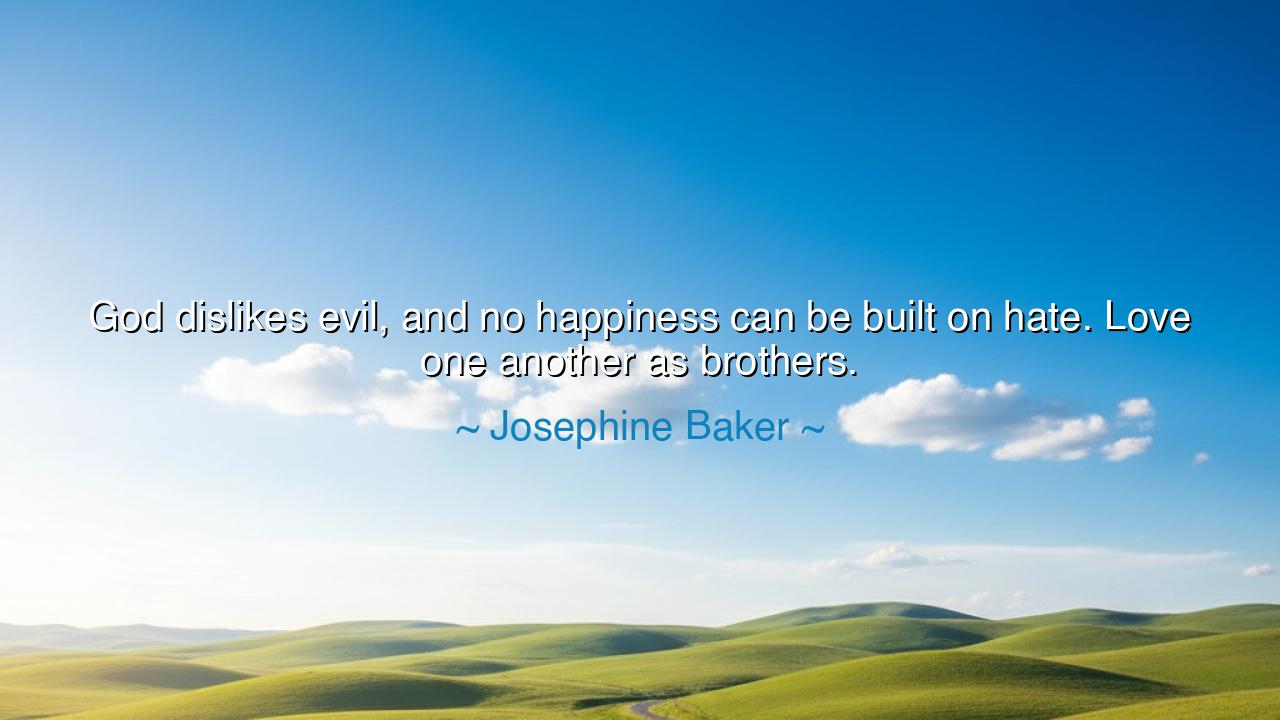
God dislikes evil, and no happiness can be built on hate. Love
God dislikes evil, and no happiness can be built on hate. Love one another as brothers.






“God dislikes evil, and no happiness can be built on hate. Love one another as brothers.” Thus spoke Josephine Baker, the luminous artist and humanitarian who turned her fame into a weapon for justice. Her words are simple, yet they resound like a bell through the ages — a call to the conscience of humankind. In this brief teaching, she reminds us that evil, born of hatred and division, cannot be the foundation of any lasting happiness. Love, and love alone, is the divine architecture upon which true joy and peace are built. Hers is not the weak love of sentiment, but the powerful love of courage — the love that unites, heals, and redeems even in the face of cruelty.
The origin of these words is rooted in Baker’s own life — a life marked by struggle, triumph, and fierce compassion. Born in poverty and discrimination in America, she rose to become one of the world’s most celebrated performers. Yet she never forgot the pain of injustice that shadowed her early years. When she found fame in France, she also found freedom — a place where she could breathe without the chains of segregation. But even in that freedom, she carried within her the memory of hatred, and she swore to fight against it, not with anger, but with love. Her message, therefore, was born not from comfort, but from suffering transformed into wisdom.
When Josephine Baker declared that “no happiness can be built on hate,” she spoke as one who had witnessed hatred’s poison firsthand. She saw how entire nations destroyed themselves through prejudice, how hearts hardened by fear turned upon their neighbors. She lived through a century scarred by war and genocide, and she understood that hatred, though it may promise strength, brings only ruin. True happiness, she taught, cannot exist where cruelty reigns — for happiness is the fruit of harmony, and harmony cannot grow in soil watered with bitterness. Her call to “love one another as brothers” is not naïve idealism, but moral realism. It is the recognition that only in love can humanity survive its own power.
Consider her own heroic example during the dark years of World War II. While others fled, Baker stayed to serve France, her adopted home. She became a spy for the Resistance, carrying secret messages hidden within her music sheets. She risked her life not for wealth or recognition, but for freedom, for the belief that good must rise against evil. Later, she adopted twelve children of different races and nationalities, raising them together as her “Rainbow Tribe.” In this act, she sought to prove to the world that people of all colors could live as one family — not divided by hate, but bound by love. Her life was her sermon; her deeds were her prayer.
Through her words, Baker stands in the lineage of prophets and sages who have spoken of love’s supremacy. Her teaching mirrors that of Christ, who commanded, “Love one another.” It echoes the voice of Buddha, who taught that hatred is not ended by hatred, but by love alone. And it harmonizes with the wisdom of Martin Luther King Jr., who said that love is “the only force capable of transforming an enemy into a friend.” These are not separate truths, but one eternal law: that evil destroys, and love restores. To build upon hate is to build upon sand; to build upon love is to build upon rock.
But Baker’s wisdom carries a deeper challenge — it asks us to look within ourselves. For hatred does not begin in nations or armies; it begins in the human heart. When she says, “God dislikes evil,” she reminds us that every act of cruelty, every bitterness we nourish, distances us from the divine. To “love one another as brothers” is to see in every person — even the stranger, even the enemy — the spark of the same divine fire that burns in ourselves. It is to remember that to hate another is to hate a reflection of God’s own image.
Therefore, my children, take this truth to heart: you cannot build happiness upon the bones of resentment. Every hateful thought you carry is a stone laid in the wall that separates you from peace. But every act of kindness, every forgiveness offered, every bridge you build out of compassion — these are the foundations of joy that cannot crumble. The world is healed not by anger, but by understanding; not by vengeance, but by mercy. To live in love is to dwell in the light of the divine.
And so, as Josephine Baker teaches, let your life itself be an act of love. Confront evil with courage, but never let hate claim your heart. See in others not your rivals, but your brothers and sisters. For love, though it may seem fragile, is the strongest force in the universe — stronger than fear, stronger than death, stronger than any cruelty man can devise. Build your happiness, then, not upon the fleeting victories of anger, but upon the eternal foundation of love — for that is the dwelling place of both God and peace.






AAdministratorAdministrator
Welcome, honored guests. Please leave a comment, we will respond soon